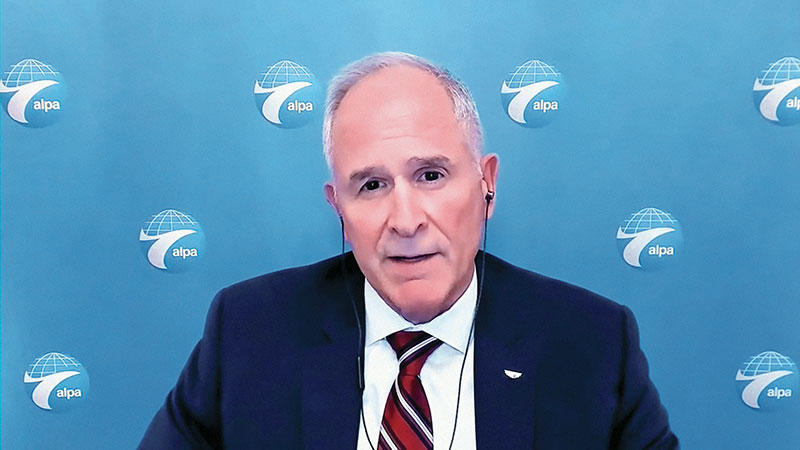ALPA President Testifies at Congressional 5G Hearing: “Safety Is Nonnegotiable”
By John Perkinson, Senior Staff Writer

“For airline pilots, safety is nonnegotiable,” said Capt. Joe DePete, ALPA’s president, in testimony presented at the February 3 U.S. House of Representatives Aviation Subcommittee hearing titled “Finding the Right Frequency: 5G Deployment & Aviation Safety.” DePete emphasized to participating policymakers that interference from the mobile wireless industry’s recent launch of 5G in the C-Band spectrum is jeopardizing safe airline operations.
“It’s not about politics or profit,” he said. “For this reason, it was an affront to us when the Federal Communications Commission [FCC] licensed part of the C-Band spectrum to the telecom sector without heeding—or even acknowledging—our concerns about aviation safety.”
DePete continued. “For pilots, new 5G service has injected more complexity—and more risk—into already-complex flight operations. We must now analyze how 5G-related regulatory directives affect departure, arrival, and alternative airports [on each flight].”
ALPA’s president noted that the Association and other aviation industry stakeholders have repeatedly raised serious concerns about plans for 5G deployment near airports because signals from these towers can interfere with radar altimeters in certain aircraft. This airborne electronic equipment measures the distance between an airplane and the terrain immediately below it and forwards this data to other crucial flight deck networks.
During the ensuing Q&A session, Rep. Troy Nehls (R-TX) asked DePete, “How do pilots know that there’s an interference problem with the radar altimeter in their aircraft?”
He replied that modern airliner systems are integrated, meaning they share data. If the radar altimeter suffers a malfunction, the crew is typically advised of a system failure. However, if radar altimeter readings are erroneous because of 5G interference, the crew could easily be unaware that a problem exists. As an example, DePete noted that the aircraft might experience some unusual autothrottle activity. “Imagine if we [the pilots] didn’t get the warning that we were approaching terrain when we should…and when we shouldn’t. That creates another problem, as well,” he said.
DePete answered questions from a half dozen Aviation Subcommittee members, including Rep. Kaiali‘i “Kai” Kahele (D-HI), a Hawaiian Airlines Airbus A330 first officer and ALPA member. In his remarks, Kahele posed the question, “How can we in the future ensure pilots’ concerns…are taken more seriously?”
Kahele referenced when, in 2018, ALPA and others in the aviation community expressed apprehensions because the FCC had auctioned licenses for use of the 5G C-Band spectrum to telecommunications companies. C-Band transmissions operate in frequencies dangerously close to those used by radar altimeters. The Association offered to work with the wireless industry to conduct a comprehensive study of the effects of these proposed transmissions on aircraft navigation systems, but this offer was essentially ignored.
The FAA recently issued more than 1,800 notices to air missions related to the activation of 5G C-Band wireless towers with far-reaching implications for air transportation. Following the January 19 network launch, multiple airlines were initially compelled to cancel or change flights based in part on advisories from aircraft manufacturers. Despite the creation of buffer zones at 50 major airports for a six-month period, irregularities from 5G interference have been reported at facilities across the nation, from William P. Hobby Airport in Houston, Tex., to Paine Field in Seattle, Wash.
In his testimony, DePete outlined basic steps to address ongoing safety risks. He stressed that action needs to be taken to
- Fund and charge the FAA with staying informed and included in national spectrum strategies.
- Require the FCC to share publicly the new service transmitting data when issuing a new or revising an existing license.
- Require the FCC to collaborate with, and defer to, U.S. government agencies charged with safety oversight.
- Grant the FAA authority to reject new or expanded FCC spectrum applications that affect aviation until safety can be ensured, and
- Require the FAA to share information on approved alternative methods of compliance.
“Airline pilots, as the arbiters of safety, are trained for life to decide when every flight is safe,” said DePete. “However, the U.S. government must do more to safeguard air transportation as 5G service expands, and ALPA pilots are more than ready to assist.”
Radar Altimeter Interference
Get more information on 5G interference to aircraft radar altimeters.

